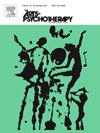舞蹈/运动疗法改善自闭症谱系障碍儿童核心症状的研究
IF 1.5
3区 心理学
Q3 PSYCHOLOGY, CLINICAL
引用次数: 0
摘要
目的评价舞蹈运动疗法在非临床环境下减少自闭症儿童限制性重复行为和提高社交技能方面的效果。方法选取中国上海某智力康复中心的28名自闭症儿童作为研究对象。将他们分为舞蹈动作治疗实验组(17名)和对照组(11名)。舞蹈动作治疗实验组接受干预训练11个月。采用相关量表评估自闭症儿童的限制性重复行为和社交技能,评估干预训练前后自闭症儿童的变化。结果经舞蹈动作治疗干预后,实验组在ABC症状量表、RBS-R量表、社会反应量表(SRS)和社会沟通问卷(SCQ)得分均有显著改善。相比之下,对照组没有表现出明显的变化。结论舞蹈运动疗法对减少自闭症儿童限制性重复行为和提高社交技能有积极作用。本文章由计算机程序翻译,如有差异,请以英文原文为准。
A study on dance/movement therapy to improve core symptoms in children with autism spectrum disorder
Objectives
This study aims to evaluate the effectiveness of dance movement therapy in reducing restricted repetitive behaviors and enhancing social skills in children with autism in a non-clinical setting.
Methods
A total of 28 children with autism from an intelligence rehabilitation center in Shanghai, China, were selected for the study. They were divided into a dance movement therapy experimental group (17 children) and a control group (11 children). The dance movement therapy experimental group received intervention training for 11 months. Relevant scales were used to assess restricted repetitive behaviors and social skills in children with autism and the changes in these children before and after the intervention training were evaluated.
Results
After the dance movement therapy intervention, the experimental group showed significant improvements in the scores on the ABC Symptom Scale, the RBS-R Scale, the Social Responsiveness Scale (SRS), and the Social Communication Questionnaire (SCQ). In contrast, the control group did not exhibit significant changes.
Conclusion
Dance movement therapy has a positive effect on reducing restricted repetitive behaviors and enhancing social skills in children with autism.
求助全文
通过发布文献求助,成功后即可免费获取论文全文。
去求助
来源期刊

Arts in Psychotherapy
Multiple-
CiteScore
3.20
自引率
11.10%
发文量
66
期刊介绍:
The Arts in Psychotherapy is a dynamic, contemporary journal publishing evidence-based research, expert opinion, theoretical positions, and case material on a wide range of topics intersecting the fields of mental health and creative arts therapies. It is an international peer-reviewed journal publishing 5 issues annually. Papers are welcomed from researchers and practitioners in the fields of art, dance/movement, drama, music, and poetry psychotherapy, as well as expressive and creative arts therapy, neuroscience, psychiatry, education, allied health, and psychology that aim to engage high level theoretical concepts with the rigor of professional practice. The journal welcomes contributions that present new and emergent knowledge about the role of the arts in healthcare, and engage a critical discourse relevant to an international readership that can inform the development of new services and the refinement of existing policies and practices. There is no restriction on research methods and review papers are welcome. From time to time the journal publishes special issues on topics warranting a distinctive focus relevant to the stated goals and scope of the publication.
 求助内容:
求助内容: 应助结果提醒方式:
应助结果提醒方式:


